|
THE LIBERATION OF PARIS, 25TH - 26TH AUGUST 1944
by Major John Davie
Late Grenadier Guards and Derbyshire Yeomanry
|
Major Davie, having fought in North Africa, became the Military Liaison Officer escorting the BBC correspondents from D-Day, including Howard Marshall and Richard Dimbleby. The following is an extract from his first-hand account of the BBC’s entry into Paris.
It was 25th August, and at the little hotel at Rambouillet 30 minutes west of Paris that every war correspondent in Europe it seemed had assembled to cover the entry of the Allies into the French capital. General Koenig, commanding the French Forces of the Interior (FFI), had announced on 23rd August that Paris had been liberated by the FFI, but on this day it was still impossible to reach the city, for heavy fighting was still going on in the suburbs.
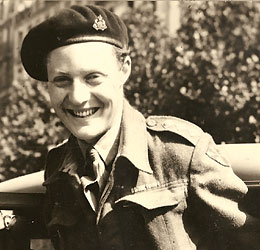
John Davie on the Champs-Élysées
acknowledging the cheering crowds |
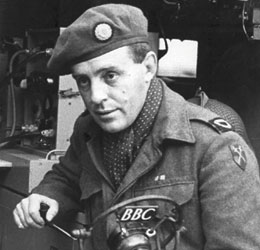
BBC Correspondent Howard Marshall
broadcasting from Paris |
While we waited at the hotel, it was amusing to watch the correspondents anxiously awaiting news that the road to Paris had been cleared. In one corner of the garden sat Ernest Hemingway surrounded like some elderly scout leader by a small group of French youth wearing the same armband as the French Maquis. A road map of France was spread on his knee and with the aid of this he was apparently directing their activities to provide copy, so it was said by his rivals, for a post war book. But, in the main, the correspondents were chiefly occupied in keeping watch on each other for fear that one of them might slip away and be the first to enter Paris. Only the evening before, after a rumour that the road was clear, we had watched a mad rush of correspondents set off from the hotel to be followed two hours later by the return of the shaken and dejected group who had soon found themselves in the centre of a night bombardment.
It was 4.00pm in the afternoon before we finally took to the road and were once more passing through villages thronged by excited, cheering people who, in spite of the reported food shortage, now poured countless tomatoes on our vehicles, while the squashed fruit lay everywhere on the roads.
Approaching Paris from the south by the Port d’Orleans, the crowds grew denser and soon there was only a narrow channel left through which the endless stream of vehicles could pass, while at every halt the people swarmed over the car, seizing our hands, kissing us and thanking us for coming. ‘For four years’ they said, ‘we have waited for you and now you have come’. For eight interminable days, these people had fought the Germans alone and gained the victory, but now they had exhausted their ammunition and we had arrived in the nick of time.
But the fighting in Paris was not yet over. The Germans were still holding out in many parts of the city, and even in those from which they had been ejected, snipers, both French and German, were still firing from the rooftops.
It was difficult to reach the Scribe Hotel which had been chosen as Press HQ, and finding ourselves heavily fired on at the northern end of the Boulevard Raspail in making the attempt, I swung the car round and retired at high speed to the safety of a local café where, as though we had had entered a world at peace, we were toasted with wine to the strains of Tipperary and God Save The King, picked out on the piano by a Russian girl as I hummed into her ear the evidently not too familiar tunes.
Next door was an hotel, and thinking it was better to live here than to be killed on the way to the Scribe, we unloaded our baggage, encouraged in our work by a new outburst of firing from the neighbouring rooftops. A Flemish art dealer from the house next door now pressed us to join him for dinner, and in a short time we found ourselves sitting down to a choice meal with several wines while the sounds of battle gradually grew less with approaching darkness.
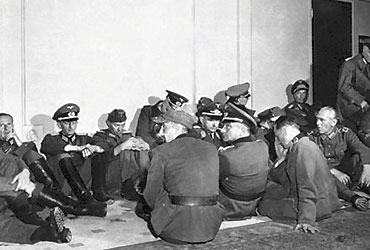 Despondent high ranking German Officers sitting
on the floor in the Hotel de Ville
|
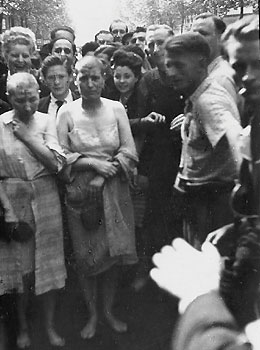
Two shaven headed women accused of collaboration amongst a crowd of Parisians |
Our host, realising the importance of getting our message through to London, offered to guide us after dark to the nearest radio station of the FFI. Outside the door at that moment appeared an FFI radio van playing the Marsellaise in the darkness of the street. They told us to follow them as they were going our way, and so, with our lights turned off, we followed on. The van then stopped unable to go further and we were taken by a cyclist who finally brought us to the transmitter. It was in the early hours of the morning, therefore, that the BBC’s Howard Marshall delivered his first news of our arrival in Paris. That nothing was ever heard of his talk in London was just one of those heartbreaking disasters that happen to us all.
Next morning our host offered to arrange for us to see Paris and we went to see the Prefect of Police at the Hotel de Ville amid wild scenes of welcome and enthusiasm. Two gendarmes were immediately put at our disposal and took us to see a few of the prisoners. First there was a room full of German troops, sour and embittered with evil faces. In another room were the officers sitting on the floor in their smart uniforms, disconsolate and miserable. Then to a room where the collaborators were put, the men and women divided by a partition. Many of the women had their heads shaved and were sobbing by the table, while the men, some of whom had been badly beaten up, with bruised and swollen faces, pondered miserably on the future that awaited them. But the worst characters were in the last room, Frenchmen who had aided the Gestapo. They clearly knew the fate that awaited them and mad terror was written on their faces as they frantically protested their innocence.
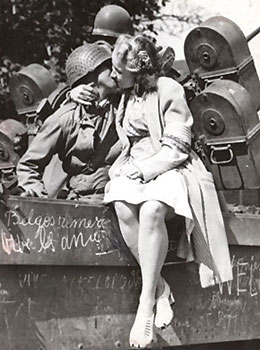 An American soldier being kissed by a French girl An American soldier being kissed by a French girl |
I was glad at last to get away and with two gendarmes, the art dealer and Howard Marshall, start on our tour of the city. It was not difficult to see the signs of the eight days of battle. Blockades in the streets were everywhere, German vehicles lay overturned and burnt out, lamp posts were down and roads were up in all directions, and all Paris dressed in its best was out on cycles to see the scenes of battle. At one point we ran into a crowd moving down the street and at their head two middle aged women were being marched along bare footed, heads shaved and dressed only in their underclothes, with red swastikas painted on their cheeks. Their brothers were prisoners of the Germans and taking advantage of the sympathy thus offered they had acted as spies for the Germans.
We drove on through the streets of Paris, cheered on as we went by the crowds with cries of Vive L’Angleterre, Vive le BBC. Sometimes we stopped to talk to the people and in a moment the car was surrounded by immense crowds all wanting to kiss us. To be kissed by the gorgeous girls that abounded everywhere was pleasant enough but one had to take the rough with the smooth and once, to the delight of the crowd, I was hugged by an old and emaciated woman.
In the afternoon, de Gaulle was to lay a wreath at the Arc de Triomphe and then move down the Champs Elysees in procession to a service in Notre-Dame. Howard and I were recording the scenes at the Arc de Triomphe and from thence we made our way. The Place de la Concorde was packed with hundreds of thousands of people as were both sides of the Champs Élysées. All Paris was out to see de Gaulle. By the time we arrived at the Place de la Concorde all the roads had been cleared and we had them to ourselves, attended as we still were by the two gendarmes. At the sight of our Union Jack and the BBC, the crowds cheered so wildly that, entering into the spirit of the moment, we drove up the Champs Élysées at 5mph, standing up in our car waving back to the roaring crowds like visiting monarchs, the only car moving on the road.
Chaos reigned at the Arc de Triomphe where cars and tanks had become inextricably entangled, blocking the approach for de Gaulle. The Prefect of Police was running wildly hither and thither, entirely out of control, trying to restore order before de Gaulle’s arrival.
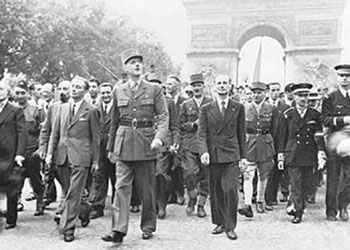 General De Gaulle and his entourage proceeding from
General De Gaulle and his entourage proceeding from
the Arc de Triomphe to Notre Dame |
De Gaulle appeared at last and, alighting from his car, walked slowly up to the Tomb of The Unknown Warrior. Here again, wild screams took place as crowds of press photographers surged around the General making it almost impossible for him to advance. One of our devoted gendarmes, seeing me produce a camera, decided that no place but the best was good enough for me and propelled me forward until by the time de Gaulle had reached the Tomb I found myself standing beside him.
Afterwards, General De Gaulle and his entourage proceeded down the Champs Élysée to Notre-Dame for a Te Deum service. In a speech the following day, de Gaulle emphasized the role that the French had in the liberation, and the necessity for the French people to do their ‘duty of war’ by advancing into the Benelux countries and Germany. Two days later, on 28th August, the FFI, called ‘the combatants without uniform’, were incorporated into the New French Army (nouvelle armée française).
John Davie died in 1998, aged 88. He served in the Grenadier Guards from 1932 to 1936, of which over two years were in Bengal as ADC to Sir John Anderson, the Governor. In the Second World War he served in North Africa and North West Europe with the Derbyshire Yeomanry. |
|



 Despondent high ranking German Officers sitting
Despondent high ranking German Officers sitting
 An American soldier being kissed by a French girl
An American soldier being kissed by a French girl 